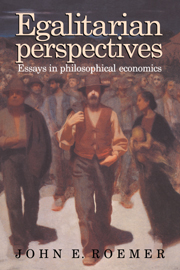Book contents
- Frontmatter
- Contents
- Acknowledgments
- List of sources
- Introduction
- Part I Exploitation
- Introduction to Part I
- 1 Exploitation, alternatives and socialism
- 2 Property relations vs. surplus value in Marxian exploitation
- 3 Should Marxists be interested in exploitation?
- 4 What is exploitation? Reply to Jeffrey Reiman
- 5 Second thoughts on property relations and exploitation
- Part II Equality of resources
- Part III Bargaining theory and justice
- Part IV Public ownership and socialism
- References
- Index
Introduction to Part I
Published online by Cambridge University Press: 23 December 2009
- Frontmatter
- Contents
- Acknowledgments
- List of sources
- Introduction
- Part I Exploitation
- Introduction to Part I
- 1 Exploitation, alternatives and socialism
- 2 Property relations vs. surplus value in Marxian exploitation
- 3 Should Marxists be interested in exploitation?
- 4 What is exploitation? Reply to Jeffrey Reiman
- 5 Second thoughts on property relations and exploitation
- Part II Equality of resources
- Part III Bargaining theory and justice
- Part IV Public ownership and socialism
- References
- Index
Summary
The essays in this part develop the claim that the Marxian concept of exploitation, defined as the extraction of surplus labor at the point of production, should be replaced by a definition which gives priority to property relations. The property-relations definition makes clear what the surplus-labor definition fails to, that the ethical condemnation of capitalism, from the Marxian viewpoint, is based on the unequal access to society's alienable means of production. This, at least, is the position that I take, although it is challenged by two types of criticism: those, like Allen Wood's (1981), that claim Marxism makes no ethical condemnation of capitalism (at least, not on grounds of exploitation), and those, like Jeffrey Reiman's, that claim that the ethical bad that exploitation diagnoses concerns social relations at the point of production, while my concept is entirely “distributional.” I do not respond to the Wood criticism in these papers (though Geras, 1986, 1992, does, and lists many others who have). Essay 4 is included here because it responds specifically to criticisms of the Reiman variety.
The reader will note that my proposal for a property-relations definition of exploitation changes in these papers.
- Type
- Chapter
- Information
- Egalitarian PerspectivesEssays in Philosophical Economics, pp. 13 - 14Publisher: Cambridge University PressPrint publication year: 1994



